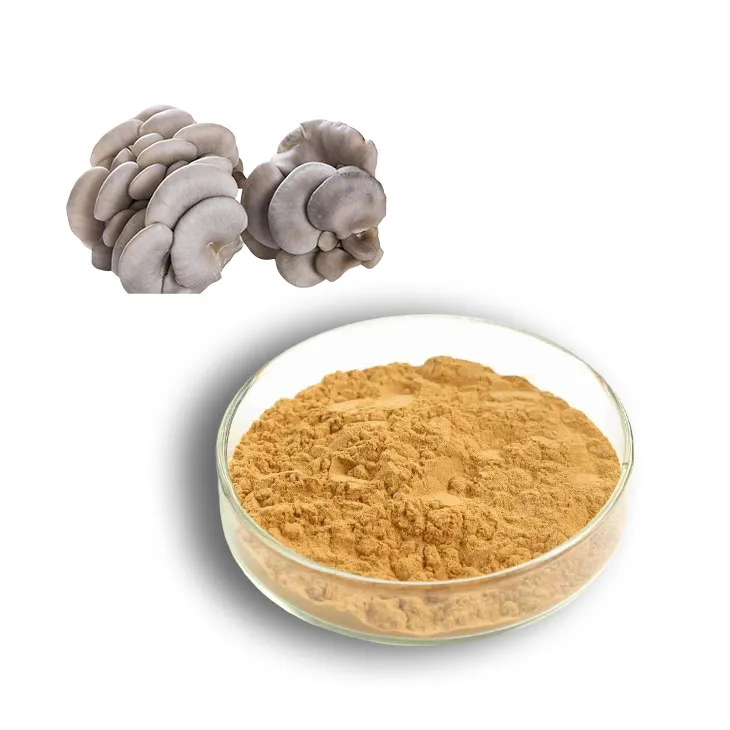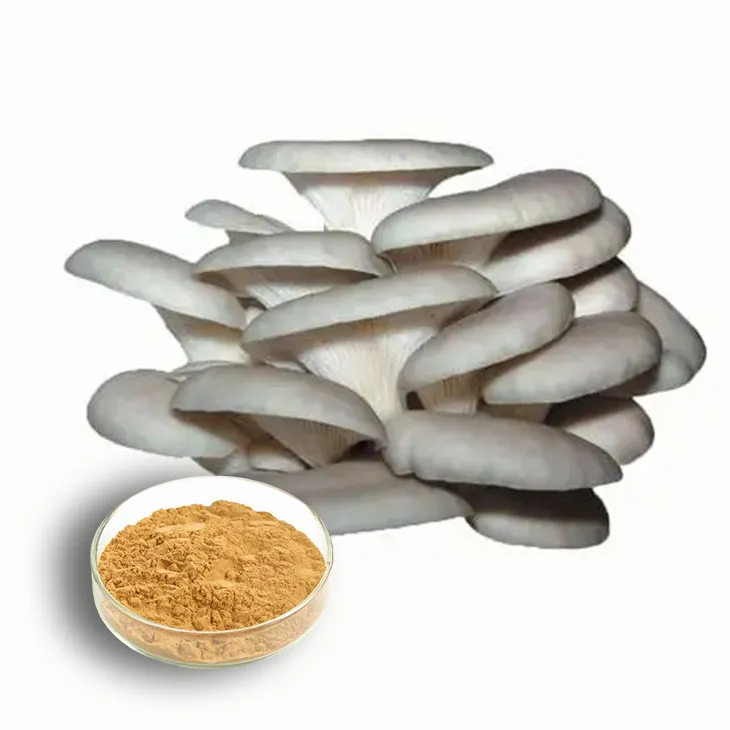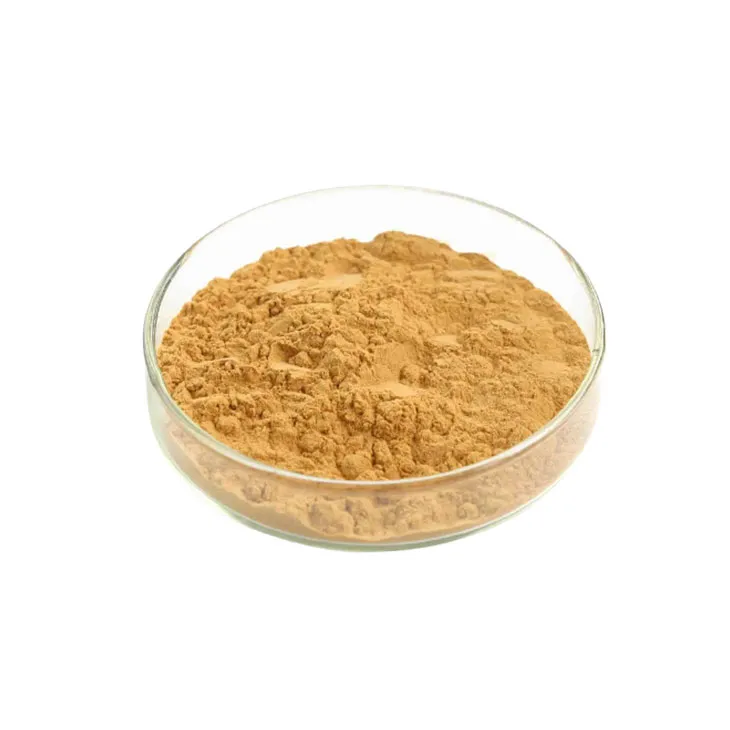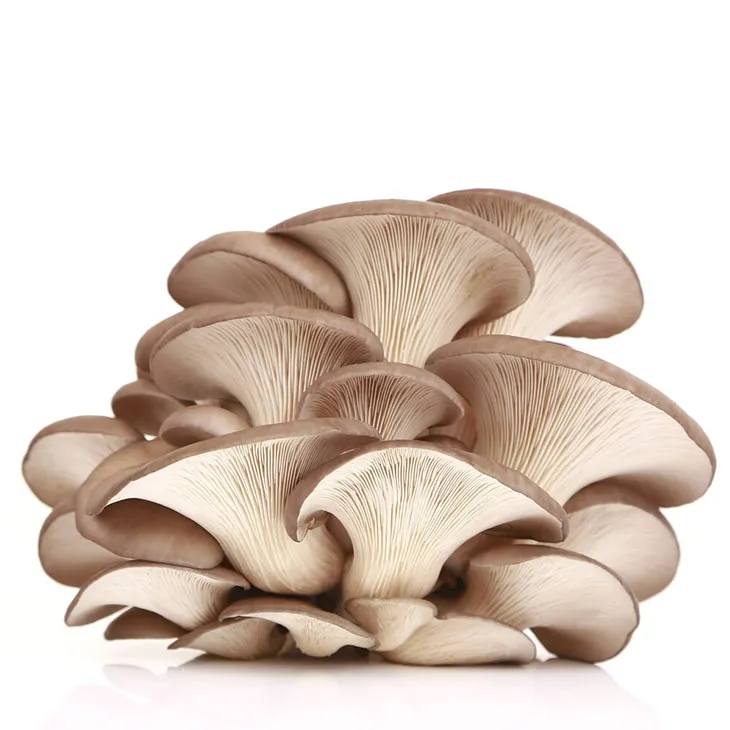- 0086-571-85302990
- sales@greenskybio.com
Components of oyster mushroom extract powder in fertilizers and feeds.
2024-12-02

1. Introduction
Pleurotus ostreatus, commonly known as the oyster mushroom, has been widely studied for its potential applications in various fields. Oyster Mushroom Extract Powder is of particular interest when it comes to fertilizers and feeds. This powder contains a diverse range of components that can bring significant benefits to both plant growth and animal nutrition.

2. Oyster Mushroom Extract Powder in Fertilizers
2.1 Minerals
One of the important components of Oyster Mushroom Extract Powder as a fertilizer is minerals.
- Potassium: It plays a crucial role in plant growth. Potassium is involved in processes such as photosynthesis, where it helps in the opening and closing of stomata. This enables plants to regulate gas exchange and water loss. In oyster mushroom extract powder, potassium may be present in a form that is easily accessible to plants. For example, it can be bound to organic compounds that gradually release potassium ions as the soil conditions change. This slow - release mechanism ensures a continuous supply of potassium to the plants throughout their growth cycle.
- Phosphorus: Phosphorus is essential for plant development, especially for root growth and flowering. In the oyster mushroom extract powder, phosphorus may be present in different chemical forms. Some of it could be in the form of organic phosphates, which need to be broken down by soil microorganisms into inorganic phosphates before plants can absorb them. This process not only provides a source of phosphorus for plants but also promotes the activity of beneficial soil microbes.
- Calcium: Calcium is important for maintaining the structural integrity of plant cells. It is involved in cell wall formation and also helps in regulating various physiological processes in plants. The calcium in oyster mushroom extract powder can contribute to strengthening plant tissues, making plants more resistant to diseases and environmental stresses such as drought and high winds.
2.2 Organic Matter
- Cellulose and Hemicellulose: Oyster mushrooms are known to break down complex organic materials such as lignocellulose. When the oyster mushroom extract powder is used as a fertilizer, it can introduce partially digested cellulose and hemicellulose into the soil. These substances can act as a food source for soil organisms. Soil bacteria and fungi can further decompose these polysaccharides, releasing nutrients and improving soil structure. For example, the decomposition of cellulose can lead to the formation of humus, which is a dark, organic - rich material that improves soil fertility, water - holding capacity, and aeration.
- Amino Acids and Proteins: Although in relatively small amounts compared to dedicated protein - rich fertilizers, oyster mushroom extract powder can contain amino acids and proteins. These can be beneficial for plants in several ways. Amino acids can be directly absorbed by plants and used in the synthesis of their own proteins. They can also act as chelating agents, binding to metal ions such as iron and zinc, making these nutrients more available to plants. In addition, proteins in the extract powder can be decomposed by soil proteases into amino acids, providing a long - term source of nitrogen for plants.
- Growth - Promoting Substances: The oyster mushroom extract powder may also contain growth - promoting substances such as plant hormones or their precursors. For example, auxins are plant hormones that are involved in cell elongation, root initiation, and apical dominance. The presence of auxin - like substances in the oyster mushroom extract powder can stimulate plant growth, especially in the early stages of development. Similarly, cytokinins, which are involved in cell division and differentiation, may also be present in small amounts, contributing to overall plant vigor.

3. Oyster Mushroom Extract Powder in Feeds
3.1 Amino Acids
- Essential Amino Acids: Oyster mushroom extract powder is rich in essential amino acids, which are amino acids that animals cannot synthesize on their own and must obtain from their diet. For example, lysine is an essential amino acid that is important for muscle development in animals. In the powder, lysine is present in a form that can be easily digested and absorbed by animals. Another essential amino acid, methionine, is crucial for the synthesis of proteins and for the metabolism of sulfur - containing compounds in animals. The presence of a balanced profile of essential amino acids in the oyster mushroom extract powder makes it a valuable component in animal feeds.
- Non - essential Amino Acids: In addition to essential amino acids, the powder also contains non - essential amino acids. These amino acids can still play important roles in animal nutrition. For instance, glutamic acid can enhance the flavor of feed, which can improve the palatability and thus the feed intake of animals. Moreover, non - essential amino acids can be used by animals for various physiological processes, such as the synthesis of non - protein nitrogen - containing compounds.
3.2 Trace Elements
- Iron: Iron is an essential trace element for animals. It is involved in oxygen transport (as part of hemoglobin) and in various enzymatic reactions in the body. In oyster mushroom extract powder, iron may be present in a form that is more bioavailable compared to some inorganic sources. This can help prevent iron - deficiency anemia in animals, especially in young or pregnant animals where the demand for iron is high.
- Zinc: Zinc is required for normal growth, reproduction, and immune function in animals. It is involved in the activity of numerous enzymes. The zinc in the oyster mushroom extract powder can contribute to maintaining healthy skin and fur in animals, as well as promoting proper wound healing. It can also play a role in improving the reproductive performance of animals, for example, by ensuring normal sperm development in male animals.
- Selenium: Selenium is an important antioxidant in animals. It is incorporated into selenoproteins, which play a role in protecting cells from oxidative damage. The presence of selenium in oyster mushroom extract powder can enhance the antioxidant capacity of animals, reducing the risk of various diseases associated with oxidative stress, such as muscle degeneration and immune system disorders.
3.3 Other Nutritional Components
- Fiber: Although animals do not digest fiber as efficiently as they do other nutrients, a certain amount of fiber in the feed can be beneficial. In oyster mushroom extract powder, fiber can help regulate the digestive process in animals. It can prevent constipation by adding bulk to the feces and can also promote the growth of beneficial gut bacteria. For example, some types of fiber can act as a prebiotic, providing a substrate for the growth of bifidobacteria and lactobacilli in the gut, which are known for their positive effects on gut health.
- Vitamins: Oyster mushroom extract powder may contain small amounts of vitamins. For example, it may contain niacin (vitamin B3), which is involved in energy metabolism in animals. The presence of vitamins in the powder can complement the overall vitamin intake of animals, especially if their diet is deficient in certain vitamins. However, the vitamin content in the oyster mushroom extract powder is generally not as high as in dedicated vitamin - rich supplements, but it can still contribute to the overall nutritional balance of the feed.

4. Benefits of Using Oyster Mushroom Extract Powder in Fertilizers and Feeds
4.1 For Plants
- Improved Growth: The combination of minerals and organic matter in oyster mushroom extract powder provides plants with a comprehensive source of nutrients. This leads to improved growth, including increased height, more extensive root systems, and greater leaf area. For example, the potassium in the powder can enhance the plant's ability to tolerate stress, while the growth - promoting substances can stimulate cell division and elongation, resulting in faster - growing plants.
- Enhanced Disease Resistance: The components in the oyster mushroom extract powder can also enhance the plant's immune system. Calcium, for instance, can strengthen cell walls, making it more difficult for pathogens to penetrate. Additionally, the growth - promoting substances may stimulate the plant's natural defense mechanisms, such as the production of phytoalexins, which are antimicrobial compounds produced by plants in response to pathogen attack.
- Sustainable Soil Improvement: Using oyster mushroom extract powder as a fertilizer can contribute to sustainable soil management. The organic matter in the powder enriches the soil, improving its structure and fertility over time. This reduces the need for synthetic fertilizers, which can have negative environmental impacts such as soil acidification and water pollution.
4.2 For Animals
- Better Growth Performance: The amino acids and trace elements in oyster mushroom extract powder are essential for animal growth. They can lead to increased body weight gain, improved feed conversion ratio (i.e., animals require less feed to gain a certain amount of weight), and shorter production cycles. For example, in poultry, the balanced amino acid profile in the powder can result in faster - growing chicks with better - developed muscles.
- Improved Product Quality: In addition to growth performance, the use of oyster mushroom extract powder in feeds can also improve the quality of animal - derived products. In livestock, such as cows, the presence of certain nutrients in the powder can lead to better - quality milk, with higher protein and fat content. In fish farming, the powder can improve the color and texture of fish flesh, making it more marketable.
- Enhanced Immune Function: The trace elements and other nutrients in the oyster mushroom extract powder can boost the immune system of animals. This can reduce the incidence of diseases, leading to less use of antibiotics in animal production. For example, selenium in the powder can enhance the antioxidant defense system in animals, protecting them from oxidative stress - related diseases and improving their overall health.

5. Conclusion
Oyster mushroom extract powder contains a variety of components that make it a valuable addition to both fertilizers and feeds. In fertilizers, its minerals and organic matter can promote plant growth and improve soil health. In feeds, its amino acids, trace elements, and other nutritional components can enhance animal performance and the quality of animal - derived products. As research continues, it is likely that more benefits and potential applications of oyster mushroom extract powder will be discovered, further highlighting its importance in sustainable agriculture and animal husbandry.
FAQ:
Question 1: What are the main minerals in oyster mushroom extract powder used as fertilizer?
As a fertilizer, oyster mushroom extract powder may contain minerals such as potassium, phosphorus, and calcium. Potassium helps in photosynthesis and overall plant vigor. Phosphorus is crucial for root development and flowering. Calcium contributes to cell wall structure and stability in plants.
Question 2: How do the amino acids in oyster mushroom extract powder improve animal performance in feed?
The amino acids in oyster mushroom extract powder are the building blocks of proteins. When animals consume feed with these amino acids, they can better synthesize their own proteins. This leads to improved muscle development, growth rate, and overall health. For example, essential amino acids like lysine and methionine are necessary for proper growth and function in animals.
Question 3: Are there any specific organic matter components in oyster mushroom extract powder for fertilizer?
Yes, there are. It may contain complex organic compounds such as polysaccharides and lignin - derived substances. These can improve soil structure by enhancing soil aggregation, which in turn promotes better water - holding capacity and aeration. The organic matter also serves as a food source for soil microorganisms, which can further release nutrients for plant uptake.
Question 4: How can the trace elements in oyster mushroom extract powder in feed benefit animal - derived products?
The trace elements in the powder, such as zinc, selenium, and iron, can have positive impacts on animal - derived products. For example, selenium can enhance the antioxidant properties in animal tissues, which may lead to better - quality meat with improved shelf - life. Zinc is important for proper immune function in animals, and this can result in healthier animals and potentially higher - quality products like milk or eggs.
Question 5: What is the role of oyster mushroom extract powder in promoting plant growth as a fertilizer?
The powder can promote plant growth in multiple ways. Its minerals and organic matter can directly supply nutrients to plants. The organic matter can also improve soil fertility and structure. Additionally, it may contain growth - promoting substances like plant hormones or their precursors that can stimulate root growth, shoot elongation, and overall plant development.
Related literature
- The Composition and Nutritional Value of Oyster Mushroom Extract in Agriculture"
- "Oyster Mushroom Extract: A Promising Component in Animal Feed and its Effects"
- "Analysis of the Mineral and Organic Components in Oyster Mushroom Extract Powder for Fertilization"
- ▶ Hesperidin
- ▶ Citrus Bioflavonoids
- ▶ Plant Extract
- ▶ lycopene
- ▶ Diosmin
- ▶ Grape seed extract
- ▶ Sea buckthorn Juice Powder
- ▶ Fruit Juice Powder
- ▶ Hops Extract
- ▶ Artichoke Extract
- ▶ Mushroom extract
- ▶ Astaxanthin
- ▶ Green Tea Extract
- ▶ Curcumin
- ▶ Horse Chestnut Extract
- ▶ Other Product
- ▶ Boswellia Serrata Extract
- ▶ Resveratrol
- ▶ Marigold Extract
- ▶ Grape Leaf Extract
- ▶ New Product
- ▶ Aminolevulinic acid
- ▶ Cranberry Extract
- ▶ Red Yeast Rice
- ▶ Red Wine Extract
-
Red Wine Extract
2024-12-02
-
Mangosteen extract powder
2024-12-02
-
Rosemary extract
2024-12-02
-
Lemon Balm Extract
2024-12-02
-
Hericium erinaceus extract powder
2024-12-02
-
White Willow Bark Extract
2024-12-02
-
Hedyotis Diffusa Extract
2024-12-02
-
Reishi mushroom extract
2024-12-02
-
Saffron Extract Powder
2024-12-02
-
Resveratrol extract
2024-12-02





















